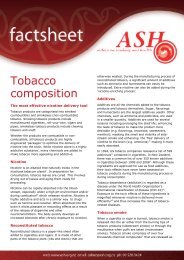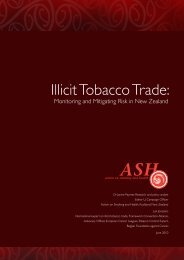Smoking and Nurses in NEW ZEALAND - ASH
Smoking and Nurses in NEW ZEALAND - ASH
Smoking and Nurses in NEW ZEALAND - ASH
You also want an ePaper? Increase the reach of your titles
YUMPU automatically turns print PDFs into web optimized ePapers that Google loves.
that is primarily responsible for smok<strong>in</strong>g related illness. This belief could be a barrier for the use of effectivesmok<strong>in</strong>g cessation medications like nicot<strong>in</strong>e replacement therapy. In fact nicot<strong>in</strong>e is responsible for addiction<strong>and</strong> it is products of combustion that have greatest risk for disease (Royal College of Physicians of London,2000; World Health Organisation, 1986)). <strong>Nurses</strong>, as well as other healthcare professionals <strong>and</strong> smokers,would benefit from <strong>in</strong>formation about the role of nicot<strong>in</strong>e.<strong>Nurses</strong> were keen to refer to smok<strong>in</strong>g cessation specialists when needed. Of the nurses surveyed theywere most likely to refer people who smoke to the Quitl<strong>in</strong>e. This is similar to an Australian survey where thetelephone based smok<strong>in</strong>g cessation services are most widely promoted (Nagle et al, 1999). They were lesslikely to refer to some of the specialist smok<strong>in</strong>g cessation programmes, <strong>and</strong> many were not aware of theexistence of these. Knowledge of these programmes could enhance service to clients. For <strong>in</strong>stance, AukatiKai Paipa offers a kaupapa Maori service reflect<strong>in</strong>g Maori culture <strong>and</strong> identity.In addition, knowledge of effective smok<strong>in</strong>g cessation treatments could be improved. Like most smokers,nurses were more likely to know of nicot<strong>in</strong>e patches <strong>and</strong> gum for smok<strong>in</strong>g cessation than medications suchas nicot<strong>in</strong>e <strong>in</strong>haler or nortriptyl<strong>in</strong>e. Treatments such as hypnosis <strong>and</strong> acupuncture were identified as effectivetreatments by more than a quarter of nurses. These treatments are often well advertised, but there is noevidence for these treatments <strong>in</strong> help<strong>in</strong>g people to stop long-term (Abbot et al, 2006; White et al, 2006).Nicobrev<strong>in</strong> was also selected by a third of nurses as be<strong>in</strong>g effective. There is currently <strong>in</strong>sufficient evidenceavailable to determ<strong>in</strong>e the effectiveness of this treatment <strong>and</strong> so it should not be recommended to smokers(Stead & Lancaster, 2006). This data confirms that further smok<strong>in</strong>g cessation tra<strong>in</strong><strong>in</strong>g should be readilyaccessible for nurses.Ideally all nurses should receive basic tra<strong>in</strong><strong>in</strong>g to address the gaps <strong>in</strong> knowledge described above. Basictra<strong>in</strong><strong>in</strong>g would equip them with some knowledge on tobacco dependence <strong>and</strong> smok<strong>in</strong>g cessation, how toprovide brief advice, <strong>and</strong> what smok<strong>in</strong>g cessation services are available to people who want help <strong>in</strong> quitt<strong>in</strong>g.It is important that it is consistent with the evidence-based national guidel<strong>in</strong>es for smok<strong>in</strong>g cessation<strong>in</strong>terventions (M<strong>in</strong>istry of Health, 2007). Tra<strong>in</strong><strong>in</strong>g needs to <strong>in</strong>clude <strong>in</strong>formation about work with prioritypopulations – Maori, Pacific Isl<strong>and</strong> peoples, pregnant women <strong>and</strong> people who use mental health <strong>and</strong>addiction services. Brief <strong>in</strong>tervention tra<strong>in</strong><strong>in</strong>g is delivered <strong>in</strong> some undergraduate nurs<strong>in</strong>g courses <strong>in</strong> NewZeal<strong>and</strong> <strong>and</strong> this should be exp<strong>and</strong>ed (<strong>Smok<strong>in</strong>g</strong> Cessation Tra<strong>in</strong><strong>in</strong>g Framework Advisory Group, 2007).In new-graduate <strong>and</strong> post-graduate sett<strong>in</strong>gs tra<strong>in</strong><strong>in</strong>g can to be tailored to the special populations nurseswork with. Advanced tra<strong>in</strong><strong>in</strong>g should also be made available for nurses so they can provide treatment.Support <strong>and</strong> education for nurse assistants <strong>and</strong> enrolled nurses is important.<strong>ASH</strong>-KAN AOTEAROA: ASSESSMENT OF SMOKING HISTORY, KNOWLEDGE AND ATTITUDES OF NURSES IN <strong>NEW</strong> <strong>ZEALAND</strong> 27





